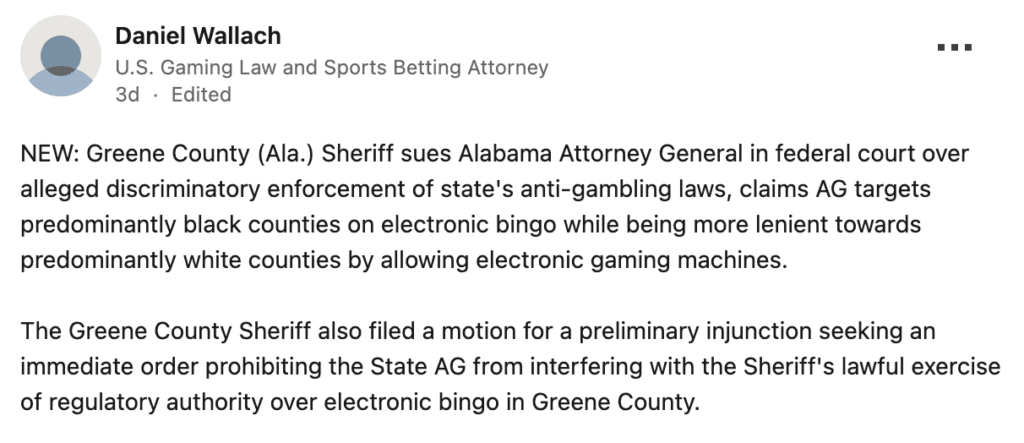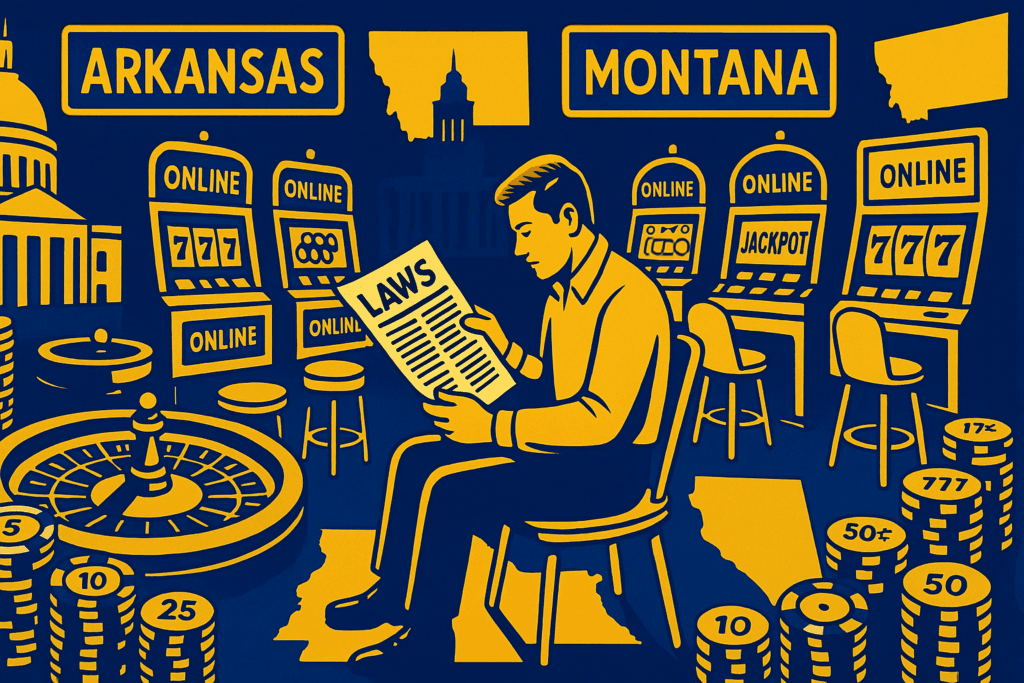The Greene County Sheriff has sued the Alabama Attorney General in US District Court, alleging discriminatory enforcement of state’s anti-gambling laws, Daniel Wallach first reported via LinkedIn.

The complaint, filed on Jan. 3, claims that Alabama Attorney General Steven T. Marshall exercises discriminatory practice in regulating electronic bingo, targeting predominantly black counties while demonstrating leniency toward predominantly white counties.
Greene County Sheriff Jonathan Benison also filed a motion requesting the court to prohibit Marshall from interfering with the Sheriff’s lawful regulation of electronic bingo in his county.
Alabama gambling law allows for local amendments
Alabama is among the country’s most restrictive states when it comes to regulated gambling. It’s also one of just a handful of US states without a state lottery. Apart from a few Native American-operated casinos, legal and regulated gambling options are largely absent.
The Alabama Constitution (Section 65) explicitly bans lotteries and games of chance, but allows for local amendments to authorize some forms of gambling. In 2003, voters approved one such amendment to allow nonprofit bingo operations in Greene County.
That same amendment also authorized the County Sheriff to regulate licenses, permits and operations of bingo establishments. As part of his authority, Sheriff Benison mandates monthly assessment fees that nonprofit bingo halls must pay directly to the Sheriff’s Department.
Greene County ‘electronic bingo’ in the courts
This isn’t the first time electronic bingo has been at the center of lawsuits in the state of Alabama, and particularly in Greene County.
On Oct. 4, 2017, the state of Alabama (led by Attorney General Steve Marshall) filed a complaint against several business entities and Jonathan Benison, seeking injunctive relief “to abate a public nuisance of unlawful gambling” in the form of electronic bingo machines.
In the complaint, the State alleged that the defendants “provide hundreds of slot machines and gambling devices in open, continuous, and notorious use” across five casinos in Greene County. The complaint also alleged that bingo cannot be played on the machines in question, which constitute gambling devices that are illegal in the state of Alabama.
During the same period, the State initiated the same legal actions against similar alleged illegal gambling activities deemed as “public nuisances” in Macon County and Lowndes County. In each of those, the circuit courts dismissed the case on the grounds the court lacked subject-matter jurisdiction to rule on the claims for injunctive and declaratory relief the State sought.
According to an Oct. 7, 2020 circuit court order dismissing the State’s complaint in Greene County:
“The adjudication of the State’s Complaint for injunctive and declaratory relief would require this Court to make a determination as to whether the Defendants’ actions in Greene County are criminal. Alabama law is clear that a civil court does not have subject matter jurisdiction to adjudicate a legal issue that would be the basis of a criminal action.”
It went on to say: “…The state statute which declared gaming as a common nuisance, Ala. Code 13-7-90 was repealed in 1977 and has not been replaced by the Legislature.”
An appeal to the Supreme Court of Alabama was also dismissed in May 2021.
A state gaming enforcement agency could help
On a national scale, the latest Greene County electronic bingo case is unique with a Sheriff suing an Attorney General over regulation and enforcement of local gambling amendments. The lack of a state-wide gambling enforcement body in Alabama doesn’t help with clarity on the matter.
This could change, though it might take a while. The Alabama House showed appetite for passing expanded gambling legislation during its 2024 session, including casino gambling, sports betting, and a state lottery. It also called for the state’s first gambling commission and stricter penalties for illegal gambling operations in the state.
A stripped-down version of the bill didn’t make it to the November ballot for a number of reasons, including an obscure procedural voting rule and debate over where regulated gambling taxes should go.
That bill included a state lottery, up to seven casinos with slots, and a compact between the state governor and the Poarch Band of Creek Indians, the federally recognized tribe operating casinos in three Alabama towns. Until the Alabama legislature passes updated gambling legislation and establishes a state-wide gaming board, it will have to rely on the courts to sort out local enforcement disputes.








